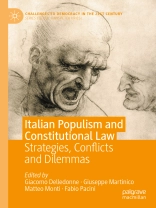This edited volume explores the relationship between constitutionalism and populism in the Italian context. Italian populism is of interest to comparative lawyers for many reasons. Firstly, the country has a long-lasting tradition of anti-parliamentarism over the course of its history as a unitary state. After the 2018 general election, it has turned into the first European country in which two self-styled populist parties formed a coalition government. Although it collapsed in August 2019, many issues that it had raised remain. Secondly, as Italy is a founding member of the European Communities, the constitutional implications of populist politics have to be considered not only within the national framework but also in a wider context. This book argues that the relationship between populism and constitutionalism should not be seen in terms of mutual exclusion and perfect opposition. Indeed, populism frequently relies on concepts and categories belonging to the language of constitutionalism (majority, democracy, people), offering a kind of constitutional counter-narrative.
Содержание
Chapter 1. Introduction: A Constitutional Viewpoint on Italian Populism (Giacomo Delledonne, Giuseppe Martinico, Matteo Monti and Fabio Pacini).- Chapter 2. Populism and Constitutional Reform. The Case of Italy (Paul Blokker).- Part I.- Chapter 3. Is there a populist turn in the Italian Parliament? Continuity and discontinuity in the non-legislative procedures (Cristina Fasone).- Chapter 4. Populism and Referendum: The Italian Debate from a Comparative Perspective (Giuseppe Martinico).- Chapter 5. Populism and Constitutional Amendment (Pietro Faraguna).- Chapter 6. Populism and Law-making Process (Fabio Pacini).- Chapter 7. Populism and Government: Continuity and Paradoxes in the Yellow-Green Experiment (Giacomo Delledonne).- Chapter 8. “Kicking the Can down the Road”. Deferring Fiscal Adjustment as a Premise for Italian Budgetary Populism (Giovanni Boggero).- Part II.- Chapter 9. Italian Populism and Fake News on the Internet: A New Political Weapon in the Public Discourse (Matteo Monti).- Chapter 10. Rise of Populism and the Five Star Movement model: An Italian Case Study (Marco Bassini).- Chapter 11. Populism, Science and the Italian Democracy (Marta Tomasi).- Chapter 12. “Le cose sono un po’ più complesse”. Constitutional Law and Religion in Italy and the populist challenge (Pasquale Annicchino).- Chapter 13. The Italian Way to Migration: Was It “True” Populism? Populist Policies As Constitutional Antigens (Simone Penasa).- Chapter 14. Does a sub-state dimension of populism exist? (Alessandro Sterpa).- Chapter 15. Populism and Criminal Justice in Italy (Nicola Selvaggi).
Об авторе
Giacomo Delledonne is Research Fellow in Comparative Public Law at the Scuola Superiore Sant’Anna, Pisa, Italy. He is co-convenor of the research group on Subnational Constitutions of the International Association of Constitutional Law. He has written extensively in four languages (Italian, English, French, and Spanish). His first monograph, L’omogeneità costituzionale negli ordinamenti composti (2017), was awarded with the 10th Opera Prima-Sergio P. Panunzio Prize, organized by the Italian Association of Constitutional Law Scholars.
Giuseppe Martinico is Associate Professor of Comparative Public law at the Scuola Superiore Sant’Anna, Pisa, Italy. Previously he was García Pelayo Fellow at the Centro de Estudios Politicos y Constitucionales (CEPC), Madrid, and Max Weber Fellow at the European University Institute, Florence. He is also Honorary Professor at the University of Henan, China, and Research Fellow at the Centre for Studies on Federalism, Turin.
Matteo Monti is a researcher in the Faculty of Law at the Scuola Superiore Sant’Anna, Pisa, Italy.
Fabio Pacini is Research Fellow in Constitutional Law at the Scuola Superiore Sant’Anna, Pisa, and Adjunct Professor of Comparative Law at the Tuscia University, Italy. He coordinates a research group on parliamentary law at the Scuola Superiore Sant’Anna.












